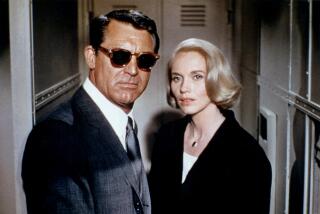Fascinating ‘Safari’ Tracks the Ambiguous Bedeaux
- Share via
In July 1934, Charles Bedeaux, a French-born self-proclaimed efficiency expert who had become one of the top five income-earners in America, embarked upon a grandiose 1,200-mile expedition across the uncharted Canadian Rockies.
He was armed with five nickel-plated Citroen caterpillars, 130 pack horses carrying 20 tons of supplies, both his wife and his mistress of the moment and 53 cowboys--one of whom recalls dining on “Patty de Frog-wah.”
He also hired ace Oscar-winning Hollywood cameraman Floyd Crosby (also father of singer David) to film the adventure.
Half a century later, Canadian filmmaker George Ungar, intrigued by the ultimately ill-fated, eternally ambiguous Bedeaux, was able to find Crosby’s amazing footage in a Paris basement.
Ungar used it to frame “The Champagne Safari,” an inspired and fascinating documentary on a near-forgotten man of whom it has been aptly said that if his incredible story had been fictional, no one would have believed it.
Bedeaux’s so-called subarctic expedition becomes the perfect metaphor of the Frenchman’s entire life and career. Born in Paris in 1886 to a civil engineer and a seamstress, Bedeaux in 1934 was at the height of his career, but his ill-fated expedition foreshadowed disasters soon to overcome him.
It is probably impossible ever to know why the handsome, middle-class Bedeaux dropped out of school to become a Montmartre barker and apprentice pimp who fled to America in 1906 with the proverbial one dollar in his pocket when his demimonde mentor was gunned down.
After much varied experience across the United States, starting with a grueling stint as a sandhog tunneling New York’s subway system, Bedeaux got his big chance in 1909 when he applied his developing notions of “scientific management” at the Mallinkrodt Chemical Works in St. Louis.
His ideas on increasing production without raising the overhead, keyed by setting quotas and standardized ways of working, caught on quickly, and he was on his way when he met and married Grand Rapids, Mich., socialite Fern Lombard. They were to become a profoundly devoted and elegant couple, with Fern dealing with his many amours with a shrewd understanding. Clearly, Bedeaux could be as charming as he was amoral.
The dehumanizing assembly-line methodology espoused by Bedeaux, skewered first by Rene Clair in “A Nous la Liberte” (1932) and then by Charlie Chaplin in “Modern Times” (1936), inevitably appealed to Germany’s Third Reich.
The appeal was so great the Reich appropriated the German branch of Bedeaux’s company, also in 1934, and Bedeaux’s struggles to regain control of it drew him into such elaborate intrigues that he ended up accused as a Nazi collaborator.
To help tell Bedeaux’s infinitely complicated and confounding story, Ungar has gathered an impressive array of experts and a lot of terrific archival material, in addition to the Crosby footage.
Today, if Bedeaux is remembered at all, it is mainly as the man who hosted the marriage of the duke and duchess of Windsor at his magnificent Renaissance chateau in the Loire Valley. It was the peak of his social success, but when he persuaded the Windsors to let him guide them on a tour of Nazi Germany “working conditions,” he miscalculated the public reaction so badly, especially from the American labor force, that he in a very real sense sealed his fate.
Totally amoral and endlessly opportunistic, Bedeaux took no sides as World War II neared, content to play them against each other until he overplayed his hand. Or so it would seem. For even as he met his fate, Bedeaux remained an enigma, as intriguing as Orson Welles’ Citizen Kane or Mr. Arkadin.
* Unrated. Times guidelines: The film is too sophisticated in content and style for small children.
(BEGIN TEXT OF INFOBOX / INFOGRAPHIC)
‘The Champagne Safari’
A First Run Features New Line presentation of a Field Seven Films production. Producer-director George Ungar. Executive producer John Walker. Writers Steve Lucas, John Kramer and Harold Crooks. Narrator Colm Feore. Voice of Bedeaux by David Hemblen. Cinematographers Floyd Crosby (in memoriam), Kirk Tougas, Douglas Kiefer, Ray Dumas, Susan Gourley. Editor John Kramer. Music Normand Roger, Denis Chartrand. Running time: 1 hour, 34 minutes.
* Exclusively at the Grande 4-Plex for one week, 345 S. Figueroa St., downtown Los Angeles, (213) 617-0268.
More to Read
Only good movies
Get the Indie Focus newsletter, Mark Olsen's weekly guide to the world of cinema.
You may occasionally receive promotional content from the Los Angeles Times.










